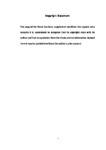A life history study of young Chinese women's experiences under the influence of traditional culture and its contemporary evolution.
| dc.contributor.supervisor | Quinn, Jocey | |
| dc.contributor.author | Liu, Wenjun | |
| dc.contributor.other | Plymouth Institute of Education | en_US |
| dc.date.accessioned | 2020-12-10T12:43:29Z | |
| dc.date.available | 2020-12-10T12:43:29Z | |
| dc.date.issued | 2020 | |
| dc.identifier | 10439369 | en_US |
| dc.identifier.uri | http://hdl.handle.net/10026.1/16732 | |
| dc.description.abstract |
As Chinese society and culture have become more complex and diverse over time, this has impacted upon the roles and experiences of women. Women continue to face significant barriers while pursuing self-development and enhanced social status. In general, Chinese culture is for men, and there exists a sharp disparity in social status between men and women. There are concerns about how the transformation of culture, family values, education systems and social beliefs affect and impact on young Chinese women. This study analyses the research on women in traditional Chinese culture, and found they have been encountering various problems, such as women's low status in families, lock of access to higher education, employment difficulty for women graduates, women's social and political participation crisis, and negative attitudes towards the gay women community. This indicates conflicts between various women roles and the influence of women's self-identity. This thesis explores the life histories of eight young Chinese women for five years and conducted a range of qualitative research, including interviews, focus groups, social media WeChat interviews, email-exchanges and research diaries. It used a postmodern feminist approach to address diversity, which criticised the concepts and epistemology of traditional Chinese culture, and proposed new ideas to boost women's social status. This study focused on family, higher education and LGBT experiences. It investigated the differences between traditional families and modern families in four aspects: family and education; family and marriage; family and leaving China; as well as family and employment. It also analysed the current situation of higher education in China and explored the campus-life of women students. On the basis of breaking traditional cultural conventions and old habitual ways of thinking, this study considered the matters of LGBT. It showed what LGBTs face in terms of their marginalisation by mainstream society. It told stories of emotion, love, marriage and life under difficult circumstances and this community's drive to challenge and change Chinese society's cultural norms. This study found that young Chinese women live in the shadow of the traditional patriarchal society and their identity has experienced severe contradiction and conflicts in their development. They are trying to break the bonds of tradition; however, they have to face huge pressure from society and family. Therefore, building up cultural diversity is the key to Chinese women's development. Women's development has a close connection with men's development; postmodern feminist culture leads women out of dilemma; it asks men to hear the voice of women. It shows that Chinese women's development is not simply seeking own benefits, but aims to create a better future together with men. | en_US |
| dc.language.iso | en | |
| dc.publisher | University of Plymouth | |
| dc.subject | Life history | en_US |
| dc.subject | Chinese women | |
| dc.subject | Traditional culture | |
| dc.subject | Higher Education | |
| dc.subject | Family relationships | |
| dc.subject | LGBT | |
| dc.subject.classification | PhD | en_US |
| dc.title | A life history study of young Chinese women's experiences under the influence of traditional culture and its contemporary evolution. | en_US |
| dc.type | Thesis | |
| plymouth.version | publishable | en_US |
| dc.identifier.doi | http://dx.doi.org/10.24382/901 | |
| dc.identifier.doi | http://dx.doi.org/10.24382/901 | |
| dc.rights.embargoperiod | No embargo | en_US |
| dc.type.qualification | Doctorate | en_US |
| rioxxterms.version | NA |
Files in this item
This item appears in the following Collection(s)
-
01 Research Theses Main Collection
Research Theses Main


